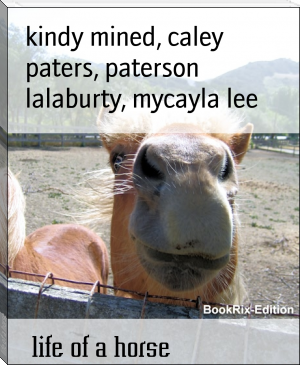Wild Beasts and Their Ways - Sir Samuel White Baker (best romantic novels in english txt) 📗

- Author: Sir Samuel White Baker
Book online «Wild Beasts and Their Ways - Sir Samuel White Baker (best romantic novels in english txt) 📗». Author Sir Samuel White Baker
It must be remembered that animals are rarely seen distinctly in a thick jungle, countless twigs and foliage intercept the bullet, and the view, although patent to both open eyes, becomes misty and obscure when you shut one eye and squint along the barrel. You then discover that although you can see the dim shadow of your game, your bullet will have to cut its way through at least twenty twigs before it can reach its goal. A solid bullet may deflect slightly, but it will generally deliver its message direct, unless the opposing objects are more formidable than ordinary small branches. A hollow bullet from an Express rifle will fly into fragments should it strike a twig the size of the little finger. This is quite sufficient to condemn the hollow projectile without any further argument.
While writing the above, I have received the Pioneer, 24th June 1888, which gives the following account of an escape from a tiger a few weeks ago by Mr. Cuthbert Fraser, and no better example could be offered to prove the danger of a hollow bullet. It will be seen that a solid bullet would have killed the tiger on the spot, as it would have penetrated to the brain, instead of which it broke into the usual fragments when striking the hard substance of the teeth, and merely destroyed one eye. The bullet evidently splashed up without breaking the jaw, as the wounded animal was not only capable of killing the orderly, but Mr. Fraser "heard, in fact, the crunching of the man's bones." He says "that he felt that he had the tiger dead when he fired, but the Express bullet unfortunately broke up." He had fired the left-hand barrel into the tiger's chest without the slightest result in checking the onset; had that been a solid bullet it would have penetrated to the heart or lungs.
ADVENTURE WITH A TIGER.
The following experience of a sportsman in the Deccan is from the Secunderabad paper of 14th June 1888:--
"Mr. Cuthbert Fraser had a most miraculous escape from a
tiger the other day at Amraoti. The lucky hero of this
adventure is a District Superintendent of Police in Berar.
He is well remembered in Secunderabad as Superintendent of
the Cantonment Police before Mr. Crawford. A son of Colonel
Hastings Fraser, one of the Frasers of Lovat, he has proved
his possession of that nerve and courage which rises to the
emergency of danger--on which qualities more than all else
the British Empire in India has been built, and on which,
after all is said, in the last resort, it must be still held
to rest. To quote the graphic account of a correspondent,
the escape was about as narrow as was ever had. Mr. Fraser
was told by his orderly that the tiger was lying dead with
his head on the root of a tree. The orderly having called
him up, he went to the spot. Mr. Fraser then sent the
orderly and another man with the second gun back, and knelt
down to look. Just then the tiger roared and came at him
from about eighteen feet off: he waited till the tiger was
within five feet of him and fired. As the tiger did not
drop, he fired his second shot hurriedly. The first shot had
hit exactly in the centre of the face but just an inch too
low. It knocked the tiger's right eye out and smashed all
the teeth of that side of the jaw. The second shot struck
the tiger in the chest, but too low. What happened then Mr.
Fraser does not exactly know, but he next found himself
lying in front of the tiger, one claw of the beast's right
foot being hooked into his left leg, in this way trying to
draw Mr. Fraser towards him; the other paw was on his right
leg. Mr. Fraser's chin and coat were covered with foam from
the beast's mouth. He tried hard to draw himself out of the
tiger's clutches. Fortunately the beast was not able to see
him, as Mr. Fraser was a little to one side on the animal's
blind side and the tiger's head was up. Suddenly seeing Mr.
Fraser's orderly bolting, he jumped up and went for the man,
and catching him he killed him on the spot. Mr. Fraser had
lost his hat, rifle, and all his cartridges, which had
tumbled out of his pocket. He jumped up, however, and ran to
the man who had his second gun, and to do so had to go
within eight paces of the spot where the tiger was crouching
over his orderly. He heard, in fact, the crunching of the
man's bones and saw the tiger biting the back of the head.
He now took the gun from his man. The latter said that he
had fired both barrels into the tiger--one when he was
crouching over Mr. Fraser, and the other when he was over
the prostrate body of the orderly. The man had fired well
and true, but just too far back, in his anxiety not to hit
the man he would save, instead of the tiger. When afterwards
asked if he was not afraid to hit the Sahib, 'I was very
much afraid indeed,' he replied, 'but dil mazbut karke
lagaya: I nerved myself for the occasion.' 'A good man and
true!' a high officer writes, 'who after firing never moved
an inch till Mr. Fraser came to him, although close to the
tiger all the while. He is one of the Gawilghur Rajputs--a
brave race, Ranjit Singh, a good name.' The man said he had
no more cartridges left and so they both got a little
farther from the tiger, as the orderly was evidently done
for. Afterwards they found one more cartridge for the gun
and tried to recover the body, but it was no use. The tiger
was lying close, most of the buffaloes had bolted and the
Kurkoos would not help. Mr. Fraser then sent six miles off
for an elephant. But the animal did not arrive till dark, so
Mr. Fraser went home in great grief about the poor orderly
and at having to leave the body. His own wound was bleeding
a great deal, it being a deep claw gash. Next day they got
the body and the tiger dead, lying close to each other.
Perhaps no narrower escape than Mr. Fraser's has ever been
heard of. To the excellent shot which knocked the beast's
eye out he undoubtedly owes his life. He says that he felt
that he had the tiger dead when he fired, but the Express
bullet unfortunately broke up. Probably, he thinks a 12-bore
would have reached the brain."
I could produce numerous instances where failures have occurred, and I know sportsmen of long experience who have given up the use of hollow bullets except against such small game as black-buck and other antelopes or deer.
So much for the Express hollow bullet, after which it is at the option of all persons to please themselves; but personally I should decline the company of any friend who wished to join me in the pursuit of dangerous game if armed with such an inferior weapon. In another portion of this volume I shall produce a striking instance of the result.
The magazine rifle, which is destined to become the military arm of the future, can hardly merit a place among sporting rifles, as it must always possess the disadvantage of altering its balance as the ammunition is expended. The Winchester Company have, I believe, produced a great improvement in a rifle of this kind, '400, which carries a charge of 110 grains of powder; but even so small a bore must be unhandy if the rifle is arranged to contain a supply of cartridges. For my own use I am quite contented with one '577, a '400, and a No. 12 Paradox - all solid bullets, but varying in hardness of metal according to the quality of game; for the largest animals a pair of No. 8 rifles with hard bullets and 14 drams of powder.
I can say nothing more concerning rifles for the practical use of sportsmen, although a volume might be devoted to their history and development. Shot guns are too well understood to merit a special notice.
CHAPTER II
THE ELEPHANT (ELEPHAS)
This animal has interested mankind more than any other, owing to the peculiar combination of immense proportions with extraordinary sagacity. The question has frequently been raised "Whether the elephant or the dog should be accepted as superior in intelligence?" My own experience would decide without hesitation--The Dog is man's companion; the Elephant is his slave.
We all know the attachment and fidelity of the dog, who appears to have been created specially to become the friend of the human race. He attaches himself equally to the poor man and the rich, and shares our fortunes "for better, for worse," clinging with heroic loyalty to his master when all other friends may have abandoned him. The power of memory is wonderfully exhibited, considering the shortness of life which Nature, by some mischance has accorded to man's best friend.
"While thus Florinda spake, the dog who lay Before Rusilla's feet, eyeing him long And wistfully, had recognised at length, Changed as he was and in those sordid weeds, His royal master. And he rose and lick'd His withered hand, and earnestly looked up With eyes whose human meaning did not need The aid of speech; and moan'd, as if at once To court and chide the long-withheld caress... . . . . . . . Disputing, he withdrew. The watchful dog Followed his footsteps close. But he retired Into the thickest grove; there yielding way To his o'erburthen'd nature, from all eyes Apart, he cast himself upon the ground, And threw his arms around the dog, and cried While tears stream'd down. Thou Theron, thou hast known Thy poor lost master... Theron, only thou!"--





Comments (0)